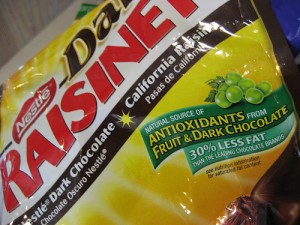
“Helps lower cholestorol.”
“Natural source of antioxidants.”
“Low fat.”
“Made with all natural ingredients.”
You’ve probably seen them all. All these are health claims you might come across in any typical grocery store. The natural instinct for the consumer is to trust these types of statements. They are often backed by a government agency, after all. But what does it mean to be a “qualified” health claim.

Here is a quote from Michael Pollan, on page 156 of In Defense of Food,
“The FDA’s own research indicates that consumers have no idea what to make of qualified health claims (how would they?), and its rules allow companies to promote the claims pretty much any way they want – they can use really big type for the claim, for example, and then print the disclaimers in teeny-tiny type.”
The FDA rules were changed in 2003 to allow for several degrees of certainty for health claims. Some may think that this allows for more flexibility for ill-founded claims by food makers, and others may think that this makes more information available to the public. Considering that the important information is usually in the fine print that hardly anyone reads, leads me to side with the first group.
Much of the evidence for health claims is only marginally supportive. There is hardly anything that we know for certain or understand about the nutrients and chemical make-up of food products or what our body does with them. In nature, many of the compounds may only helpful to our body in combination with other naturally found compounds. There is still a lot unknown about what it is about healthy food that is good for us.
One thing that we can rely on is that eating plants is generally good for human health. Our bodies have evolved alongside these plant species that we like to eat, so that now our digestive systems are well equipped to handle them. Something that we can now see is that our bodies are not as well equipped to handle highly processed plant products, like high-fructose corn syrup. Perhaps after a few more thousand years in our diet, our bodies will process it just as well as we process plants now.
From the food producing companies’ perspective, getting the right health claim printed on your product’s packaging seems like the golden ticket in the food industry nowadays. You also need to keep up with the times, because, just as quickly as one fad enters the scene, another one could take over with a new clinical study.
Health claims are in some ways the food industry’s way of pandering to the paranoia of some members of society to “be healthy,” while still working towards the goal of selling more calories. A large portion of marketing resources goes into making sure that your product is viewed in a positive light. Misleading and deceptive statements on the part of the food producer is a common way to do this.
But, from the consumer’s perspective, health claims are supposed to be helpful guidance for what kinds of choices are available. When these can’t be trusted for their face value, and the fine print is written in such a way that would require interpretation to gather real meaning, what’s the average shopper to do?
One piece of advice from Pollan is to look at the number of ingredients going into a food product. The more numerous the ingredients, the farther it is likely to have gone down the processing line. In general, processed foods are not as good for you as “whole” foods. He also suggests staying away from products that have too many hard-to-pronounce ingredients.
For more suggestions and guidance on how to approach shopping for food, my last entry about In Defense of Food is posted here and includes a summary of some of Pollan’s suggestions and a few personal observations.
Image credit:
Flicker users {Guerrilla Futures | Jason Tester} and cafemama
I like your commentary about the food industry using health claims to keep up with the paranoid and ever-changing dietary trends in our country. Our dietary habits, like so many of our habits (environmental consciousness, physical fitness, etc.) are all too often motivated by a desire for a “free lunch” if you will.
Because we so desire the benefits of eating less fat, less sugar, more antioxidants, more fiber, etc., but are too lazy to spend the money and/or time to make our own meals using fresh, natural ingredients (or even learn how to!), we are more than happy to be fooled by the health claims made by mass-producers of processed foods.
I think this is the real reason why problems like obesity and over-production of waste are so difficult to address. To make real headway, it will be necessary to change our collective habits as a society, which in turn requires a shift in our thinking. This is exceedingly difficult, especially when the change requires us to do just the opposite of what is easy, comfortable, and socially acceptable. Perhaps this is why we allow these problems to become so aggravated before making honest efforts at solving them.
I agree. It is a daunting task to try to tackle any of these problems, but I think our efforts should start at spreading knowledge. Authors like Michael Pollan are doing a good job of trying to educate the public on these issues.